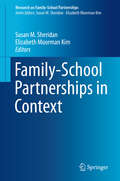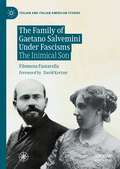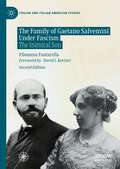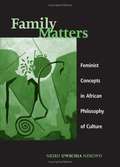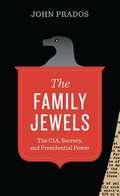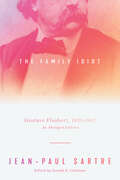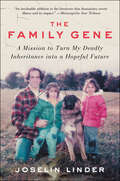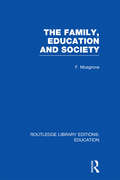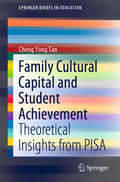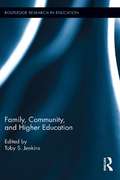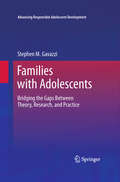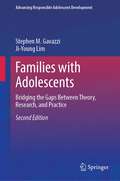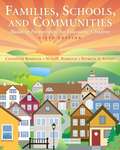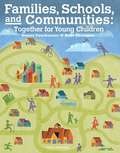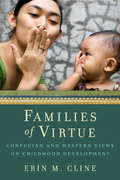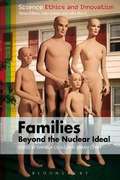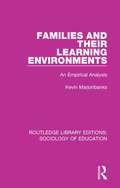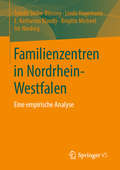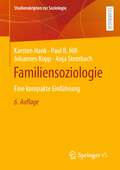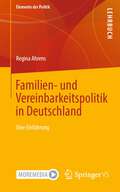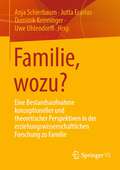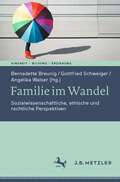- Table View
- List View
Family-School Partnerships in Context
by Susan M. Sheridan Elizabeth Moorman KimThis volume focuses on context considerations in family-school partnership research. The book examines how cultural diversity, including differences in parenting (e. g. , race, education, family history) and diverse school variables (e. g. , location, population, organization,) can affect family-school partnerships. Its bio ecological perspective pinpoints critical areas that studies need to address for real-world utility, such as parental commitment and developmental considerations. Although the book's focus is research, chapters present program designs and evaluations along with ideas for community involvement and policy. The authors also explore the changing landscape for home-school partnerships resulting from the impact of technology, which is rapidly becoming a central player in organizing research and bringing interventions to life. Topics covered include: Complexities in field-based partnership research. Family-centered, school-based interventions. A district leadership approach to school, family and community partnerships. Research issues to forward a policy agenda supporting family-school partnerships. Testing statistical moderation in research on home-school partnerships. Integrating current and evolving knowledge toward future directions for research. Contexts of Family-School Partnerships is a valuable resource for researchers, professionals and graduate students in child and school psychology, educational policy and politics, family studies, developmental psychology, sociology of education, sociology and anthropology.
The Family of Gaetano Salvemini Under Fascisms: The Inimical Son (Italian and Italian American Studies)
by Filomena FantarellaGaetano Salvemini (1873 – 1957), one of the most influential Italian intellectuals of his generation, was an historian, a professor, and a tireless anti-fascist who mentored a new generation of young intellectuals and political activists, such as Piero Gobetti, Ernesto Rossi, and Carlo & Nello Rosselli. After losing his wife and children in the 1908 Messina earthquake, Salvemini began a new family with his second wife, Fernande Dauriac, and her two children, Jean and Ghita. Yet, despite its marked influence on his life and politics, Salvemini’s second family and its involvement with fascism has never been studied before. By exploiting hitherto unused archival sources, The Inimical Son explores an until-now little known dimension of Salvemini's life; it uncovers the personal costs of his anti-fascism, including the tragic embrace of fascism by his stepson, Jean Luchaire.
The Family of Gaetano Salvemini Under Fascism: The Inimical Son (Italian and Italian American Studies)
by Filomena FantarellaGaetano Salvemini (1873 – 1957), one of the most influential Italian intellectuals of his generation, was an historian, a professor, and a tireless anti-fascist who mentored a new generation of young intellectuals and political activists, such as Piero Gobetti, Ernesto Rossi, and Carlo & Nello Rosselli. After losing his wife and children in the 1908 Messina earthquake, Salvemini began a new family with his second wife, Fernande Dauriac, and her two children, Jean and Ghita. Yet, despite its marked influence on his life and politics, Salvemini’s second family and its involvement with fascism has never been studied before. By exploiting hitherto unused archival sources, The Inimical Son explores an until-now little known dimension of Salvemini's life; it uncovers the personal costs of his anti-fascism, including the tragic embrace of fascism by his stepson, Jean Luchaire.
Family Matters: Feminist Concepts in African Philosophy of Culture
by Nkiru Uwechia NzegwuCharts new trends in gender studies through a compelling analysis of Igbo society.
The Family Jewels: The CIA, Secrecy, and Presidential Power
by John PradosIn December 1974, a front-page story in the New York Times revealed the explosive details of illegal domestic spying by the Central Intelligence Agency. This included political surveillance, eavesdropping, detention, and interrogation. The revelation of illegal activities over many years shocked the American public and led to investigations of the CIA by a presidential commission and committees in both houses of Congress, which found evidence of more abuse, even CIA plans for assassinations. Investigators and the public soon discovered that the CIA abuses were described in a top-secret document agency insiders dubbed the "Family Jewels. " That document became ground zero for a political firestorm that lasted more than a year. The "Family Jewels" debacle ultimately brought about greater congressional oversight of the CIA, but excesses such as those uncovered in the 1970s continue to come to light. The Family Jewels probes the deepest secrets of the CIA and its attempts to avoid scrutiny. John Prados recounts the secret operations that constituted "Jewels" and investigators' pursuit of the truth, plus the strenuous efforts-by the agency, the executive branch, and even presidents-to evade accountability. Prados reveals how Vice President Richard Cheney played a leading role in intelligence abuses and demonstrates that every type of "Jewel" has been replicated since, especially during the post-9/11 war on terror. The Family Jewels masterfully illuminates why these abuses are endemic to spying, shows that proper relationships are vital to control of intelligence, and advocates a system for handling "Family Jewels" crises in a democratic society.
The Family Idiot: Gustave Flaubert, 1821–1857, An Abridged Edition
by Jean-Paul SartreAn approachable abridgment of Sartre’s important analysis of Flaubert. From 1981 to 1994, the University of Chicago Press published a five-volume translation of Jean-Paul Sartre’s The Family Idiot: Gustave Flaubert, 1821-1857, a sprawling masterwork by one of the greatest intellects of the twentieth century. This new volume delivers a compact abridgment of the original by renowned Sartre scholar, Joseph Catalano. Sartre claimed that his existential approach to psychoanalysis required a new Freud, and in his study of Gustave Flaubert, Sartre becomes that Freud. The work summarizes Sartre’s overarching aim to reveal that human life is a meaningful adventure of freedom. In discussing Flaubert’s work, particularly his classic novel Madame Bovary, Sartre unleashes a fierce critique of modernity as nihilistic and demeaning of human dignity.
The Family Idiot: Gustave Flaubert, 1821–1857, An Abridged Edition
by Jean-Paul SartreAn approachable abridgment of Sartre’s important analysis of Flaubert. From 1981 to 1994, the University of Chicago Press published a five-volume translation of Jean-Paul Sartre’s The Family Idiot: Gustave Flaubert, 1821-1857, a sprawling masterwork by one of the greatest intellects of the twentieth century. This new volume delivers a compact abridgment of the original by renowned Sartre scholar, Joseph Catalano. Sartre claimed that his existential approach to psychoanalysis required a new Freud, and in his study of Gustave Flaubert, Sartre becomes that Freud. The work summarizes Sartre’s overarching aim to reveal that human life is a meaningful adventure of freedom. In discussing Flaubert’s work, particularly his classic novel Madame Bovary, Sartre unleashes a fierce critique of modernity as nihilistic and demeaning of human dignity.
The Family Idiot: Gustave Flaubert, 1821–1857, An Abridged Edition
by Jean-Paul SartreAn approachable abridgment of Sartre’s important analysis of Flaubert. From 1981 to 1994, the University of Chicago Press published a five-volume translation of Jean-Paul Sartre’s The Family Idiot: Gustave Flaubert, 1821-1857, a sprawling masterwork by one of the greatest intellects of the twentieth century. This new volume delivers a compact abridgment of the original by renowned Sartre scholar, Joseph Catalano. Sartre claimed that his existential approach to psychoanalysis required a new Freud, and in his study of Gustave Flaubert, Sartre becomes that Freud. The work summarizes Sartre’s overarching aim to reveal that human life is a meaningful adventure of freedom. In discussing Flaubert’s work, particularly his classic novel Madame Bovary, Sartre unleashes a fierce critique of modernity as nihilistic and demeaning of human dignity.
The Family Gene: A Mission to Turn My Deadly Inheritance into a Hopeful Future
by Joselin LinderA riveting medical mystery about a young woman’s quest to uncover the truth about her likely fatal genetic disorder that opens a window onto the exploding field of genomic medicineWhen Joselin Linder was in her twenties her legs suddenly started to swell. After years of misdiagnoses, doctors discovered a deadly blockage in her liver. Struggling to find an explanation for her unusual condition, Joselin compared the medical chart of her father—who had died from a mysterious disease, ten years prior—with that of an uncle who had died under similarly strange circumstances. Delving further into the past, she discovered that her great-grandmother had displayed symptoms similar to hers before her death. Clearly, this was more than a fluke. Setting out to build a more complete picture of the illness that haunted her family, Joselin approached Dr. Christine Seidman, the head of a group of world-class genetic researchers at Harvard Medical School, for help. Dr. Seidman had been working on her family’s case for twenty years and had finally confirmed that fourteen of Joselin’s relatives carried something called a private mutation—meaning that they were the first known people to experience the baffling symptoms of a brand new genetic mutation. Here, Joselin tells the story of their gene: the lives it claimed and the future of genomic medicine with the potential to save those that remain. Digging into family records and medical history, conducting interviews with relatives and friends, and reflecting on her own experiences with the Harvard doctor, Joselin pieces together the lineage of this deadly gene to write a gripping and unforgettable exploration of family, history, and love. A compelling chronicle of survival and perseverance, The Family Gene is an important story of a young woman reckoning with her father’s death, her own mortality, and her ethical obligations to herself and those closest to her.
The Family, Education and Society (Routledge Library Editions: Education)
by Frank MusgroveIn this provocative study the author challenges many contemporary assumptions about the modern family, the circumstances of home life which lead to academic success and the proper relationship between home and school. The modern family is not ‘in decline’; its history is a success story. It is stable, unsociable, emotionally potent. Over the past three centuries it has turned its back on society. It is less remarkable for rebellious children than for the remorseless pressures it can exert upon the young, particularly for ‘success’ in the school system. In the home-centred society the school is an extension of the home, created in its image. Academic success seems most certain when the ‘good home’ and the ‘good school’ form a determined alliance. The combined pressures of home and school often seem to produce withdrawn, self-disparaging and negative young men and women. The author argues that the good school must counter-act many of the influences of the good home and that the educational system must re-order its affairs so that it is able to encourage and assess achievement which comes from joy rather than neurotic drive.
Family Cultural Capital and Student Achievement: Theoretical Insights from PISA (SpringerBriefs in Education)
by Cheng Yong TanThis book focuses on the relationship between cultural capital and student achievement. It fills the gap in the literature on large-scale quantitative studies of the effects of cultural capital. In particular, the review of empirical evidence presented, especially that from studies analyzing large-scale, international data from the Programme for International Student Assessment (PISA), makes a substantial contribution to the literature. This review addresses the knowledge gap on reviews investigating the effects of different forms of cultural capital on student achievement as compared to the more established evidence base in the related field of socioeconomic status.
Family, Community, and Higher Education (Routledge Research in Education #89)
by Toby S. JenkinsThis book explores social topics and experiences that illustrate the various ways in which the family unit influences and impacts college students. In the text, the authors not only explore family memories, but also challenge the traditional lack of inclusion and appreciation for “family” as knowledge producers and educational allies. This book spotlights the family unit as a critical factor within the educational experience—one that prepares, supports, and sustains educational achievement through both everyday simple lessons and critical and difficult family challenges. Through these experiences, families teach the lessons of survival that often help students to persist in college.
Families with Adolescents
by Stephen GavazziThis book focuses a unique panoramic lens on the study of adolescent development. It offers a clear blueprint for more consistently improved practice, emphasizing family process and structure instead of individual developmental stages.
Families with Adolescents: Bridging the Gaps Between Theory, Research, and Practice (Advancing Responsible Adolescent Development)
by Stephen M. Gavazzi Ji-Young LimThe second edition of this book offers an expanded and updated blueprint for more consistently improved practice, emphasizing family process and structure instead of only individual developmental stages. Its chapters deftly summarize the recent knowledge base about families with adolescents and explains how to apply these results across mental health and social services disciplines. The new edition clearly illustrates family concerns and theoretical perspectives through real-world vignettes and cogent use of family assessment measures. Chapters offer a broad understanding of how diversity in all its forms – including race/ethnicity, culture, religion, and sexual orientation – has created a much more nuanced understanding of how families with adolescents are able to function within their environment. Both major challenges to families and communities form the backdrop of the second edition’s focus on forecasting in which the theoretical, empirical, and intervention literatures necessarily move in service to the health and well-being of families with adolescents.Featured topics include: Central concepts of family development, family systems, ecological, attachment, and social learning theories in relation to families with adolescents. Influence of the family on adolescent problem behavior, mental health concerns, substance use issues, educational attainment, and social competence outcomes. Selected studies on parenting behaviors, conflict resolution, and other major aspects of families with adolescents. Application topics in family-based intervention and prevention programs. Integrating theory, research, and applications to create a “triple threat” model. Diversity issues surrounding race/ethnicity, culture, religion, and sexual orientation. Families with Adolescents, Second Edition, is an essential resource for researchers, professors, and graduate and advanced undergraduate students as well as professionals and other mental health clinicians, practitioners, and therapists in clinical child and developmental psychology, family studies, human development, sociology, social work, education, and all allied disciplines.
Families, Schools, and Communities: Building Partnerships for Educating Children (5th Edition)
by Chandler H. Barbour Nita H. Barbour Patricia A. ScullyThis fifth edition of Families, Schools, and Communities: Building Partnerships for Educating Children provides teachers and teacher candidates with a comprehensive guide to establishing collaboration with parents and the larger community. This text will help future teachers develop the understanding and tools they need to work with others to give children a better education. The underlying message of this book is that all persons involved in early childhood education or child advocacy should join hands in promoting the highest quality of education for young children in America. Features include: Chapter Objectives, Summaries and Questions Vignettes - real life stories/events that clarify the concepts throughout the chapters. Reflections - these reflections ask the reader to pause and connect some particular content to their own life experiences. Implications for Teachers - new feature that provides connections between the ideas in the text and real life application in classrooms and schools. Bibliography of Children's Literature New to This Edition: The authors have added features and rearranged the topics to give this text better coherence and greater usability. Readers will find we have updated references and resources throughout but have streamlined the research citations to provide for smoother reading. We removed the chapter on school curriculum but included suitable parts of that in other chapters. We have renamed some chapters to reflect changes in content, and we have grouped References by each chapter. New Figures and Tables throughout the chapters update data on demographics of American families and communities. New vignettes and illustrations to help readers understand the uniqueness of family life and the diversity in our country. "Implications for Teachers:. . . " featured in each chapter give readers practical suggestions for trying out the ideas in the real world. The Special Needs area is addressed more intensely by showing readers how to work with families of children with disabilities. Family Systems Theory is highlighted to show the importance of understanding total family functioning in addition to the differences of individuals. Protecting children has a higher profile. Authors include more information on the growing problems and concerns about obesity, bullying, substance and sexual abuse and help readers fit these concerns into the role of education. Media pluses and minuses are highlighted in our chapters so readers understand when the benefits of expanded media opportunities can shift to exploitation and abuse.
Families, Schools And Communities: Together For Young Children
by Donna Couchenour Kent ChrismanFAMILIES, SCHOOLS, AND COMMUNITIES: TOGETHER FOR YOUNG CHILDREN, 5th Edition, emphasizes the role of families and communities in children's education, and is geared to meeting national standards in teacher preparation programs. Content reflects current research and best practices in education. Divided into two sections, this book helps you understand contemporary families and provides you with the skills that you will need to build relationships with families and the community. You'll find specific ideas and strategies for increasing family involvement in the community and schools, encouraging learning at home, working with military families, recognizing family strengths, diversity in the classroom, and many other topics. New content includes integration of current standards and a new video feature as well as expanded material on advocacy, technology, and strategies for dealing with parents. Available with InfoTrac Student Collections http://gocengage.com/infotrac.
Families of Virtue: Confucian and Western Views on Childhood Development
by Erin ClineFamilies of Virtue articulates the critical role of the parent–child relationship in the moral development of infants and children. Building on thinkers and scientists across time and disciplines, from ancient Greek and Chinese philosophers to contemporary feminist ethicists and attachment theorists, this book takes an effective approach for strengthening families and the character of children.Early Confucian philosophers argue that the general ethical sensibilities we develop during infancy and early childhood form the basis for nearly every virtue and that the parent–child relationship is the primary context within which this growth occurs. Joining these views with scientific work on early childhood, Families of Virtue shows how Western psychology can reinforce and renew the theoretical underpinnings of Confucian thought and how Confucian philosophers can affect positive social and political change in our time, particularly in such areas as paid parental leave, breastfeeding initiatives, marriage counseling, and family therapy.
Families of Virtue
by Erin M. ClineFamilies of Virtue reads a range of thinkers and scientists, from ancient Greek and Chinese philosophers to contemporary feminist ethicists and attachment theorists, to articulate the critical role of the parent-child relationship in the moral development of infants and children. Arguing that philosophy can support our best empirical findings to shape effective policy, this book seeks to strengthen families, help raise happier children, and successfully address current moral problems.Early Confucian philosophers argue that the general ethical sensibilities we develop during infancy and early childhood form the basis for nearly every virtue and that the parent-child relationship is the primary context within which this growth occurs. Joining these views with scientific work on early childhood, the text shows how an extensive body of research in Western psychology can bolster and renew the theoretical underpinnings of Confucian thought. Confucian philosophers can therefore help promote positive social and political change in our time, particularly in such surprising areas as paid parental leave, breastfeeding initiatives, marriage counseling, and family therapy.
Families - Beyond The Nuclear Ideal
by Sarah Chan Daniela CutasThis book examines, through a multi-disciplinary lens, the possibilities offered by relationships and family forms that challenge the nuclear family ideal, and some of the arguments that recommend or disqualify these as legitimate units in our societies. That children should be conceived naturally, born to and raised by their two young, heterosexual, married to each other, genetic parents; that this relationship between parents is also the ideal relationship between romantic or sexual partners; and that romance and sexual intimacy ought to be at the core of our closest personal relationships - all these elements converge towards the ideal of the nuclear family. The authors consider a range of relationship and family structures that depart from this ideal: polyamory and polygamy, single and polyparenting, parenting by gay and lesbian couples, as well as families created through assisted human reproduction.
Families and their Learning Environments: An Empirical Analysis (Routledge Library Editions: Sociology of Education #34)
by Kevin MarjoribanksFirst published in 1979, this study is one of the first works of educational research to include detailed assessments of family environments in an analysis of performance of children at their schools. Much of the research is based on data collected from families in Australia, Canada and England and the findings have been integrated with results from other family environments research. The study also explores social and psychological conceptual positions that will have relevance for further educational investigations. This book will be of particular interest to those studying the relationship between family environments and education, as well as the sociology of education.
Familienzentren in Nordrhein-Westfalen: Eine empirische Analyse
by Sybille Stöbe-Blossey Linda Hagemann E. Katharina Klaudy Brigitte Micheel Iris NiedingFamilienzentren sind Kindertageseinrichtungen, die in Kooperation mit unterschiedlichen Partnern ein breites und niederschwelliges Angebot für die Beratung, Unterstützung und Bildung von Familien im Sozialraum bereithalten. In Nordrhein-Westfalen wird seit 2006 im Rahmen eines Landesprogramms mehr als ein Drittel der Kindertageseinrichtungen zu Familienzentren weiterentwickelt. Das Buch enthält die Ergebnisse einer empirischen Studie und zeigt, wie Familienzentren die erweiterte Familien-, Kooperations- und Sozialraumorientierung in der Praxis umsetzen.
Familiensoziologie: Eine kompakte Einführung (Studienskripten zur Soziologie)
by Karsten Hank Paul B. Hill Johannes Kopp Anja SteinbachDer Band gibt einen fundierten Einblick in die Familiensoziologie. Dabei werden zunächst die historischen und ethnologischen Variationen der Formen familialen Lebens thematisiert und die wichtigsten Theorietraditionen der Familiensoziologie vorgestellt. Für die zentralen Gegenstandsbereiche - etwa Partnerwahl, Heiratsverhalten, innerfamiliale Interaktion, Fertilität, Familienformen sowie Trennung und Scheidung - wird der theoretische und empirische Stand der Forschung vorgestellt und diskutiert.
Familien- und Vereinbarkeitspolitik in Deutschland: Eine Einführung (Elemente der Politik)
by Regina AhrensDieses Lehrbuch gibt einen fundierten Einblick in das Politikfeld Familienpolitik. Es zeichnet die historischen Entwicklungen in Deutschland nach und zeigt politikfeldanalytische Erklärungen auf. Das Lehrbuch ermöglicht damit auch ein Verständnis der aktuellen familienpolitischen Diskurse. Es richtet sich vornehmlich an Studierende im Bachelor und Master, aber auch an Praktikerinnen und Praktiker, die sich aufgrund von neuen beruflichen Aufgaben in die Grundzüge der Familienpolitik in Deutschland einlesen möchten. Das Buch enthält ergänzendes Online-Material.
Familie, wozu?: Eine Bestandsaufnahme konzeptioneller und theoretischer Perspektiven in der erziehungswissenschaftlichen Forschung zu Familie
by Anja Schierbaum Jutta Ecarius Dominik Krinninger Uwe UhlendorffDas Buch fragt: Familie wozu? und dokumentiert konzeptionelle und theoretische Perspektiven, Entwicklungen und Kontroversen in der erziehungswissenschaftlichen Forschung zu Familie. Mit der Frage Familie – wozu? werden gezielt Themen zu Familie und Gesellschaft, Familienbeziehungen und -konstellationen, privater und öffentlicher Erziehung und Bildung aufgegriffen und diese aus spezifischen erziehungswissenschaftlichen Perspektiven diskutiert.
Familie im Wandel: Sozialwissenschaftliche, ethische und rechtliche Perspektiven (Kindheit – Bildung – Erziehung. Philosophische Perspektiven)
by Bernadette Breunig Gottfried Schweiger Angelika WalserDie Familie unterliegt einem steten Wandel, und zwar sowohl im Hinblick auf ihre Form als auch auf ihre Bedeutung und nicht zuletzt ihre Regulierung durch legale, kulturelle, religiöse oder moralische Normen. Welche Formen der Beziehung als konstitutiv für die Familie angesehen werden, steht ebenso zur Diskussion wie die Frage der Anerkennung und des Schutzes der Familie und verschiedener Familienformen durch den Staat. Insbesondere Techniken der Reproduktion und Veränderungen des sozialen Gefüges in Loslösung der ‚klassischen‘ Kernfamilie haben eine Vielzahl an neuen Familienformen wie Patchworkfamilien, Co-Parenting-Familien oder Familien mit gleichgeschlechtlichen Elternpaaren ermöglicht und normalisiert. Ziel dieses Bandes ist es, verschiedene disziplinären Perspektiven aus den Sozial- und Rechtswissenschaften, der Theologie und Philosophie zusammenzubringen, die auf die Familie und ihren Wandel mit Blick auf ausgewählte Fragestellungen und Familienformen reflektieren – wobei Co-Parenting und assistierte Reproduktion besonders im Fokus liegen.
